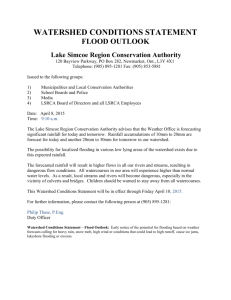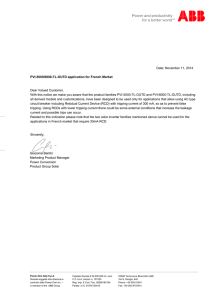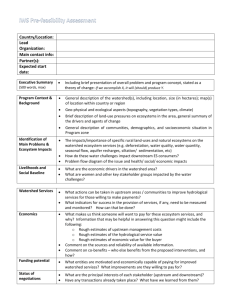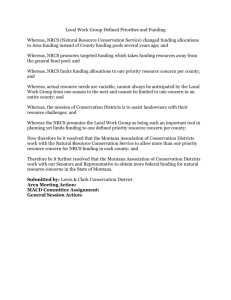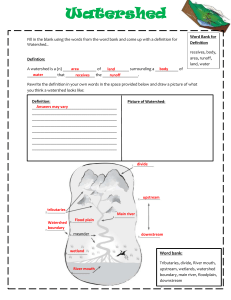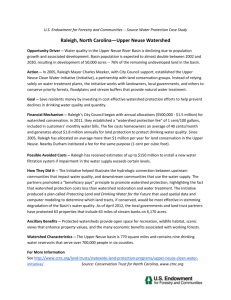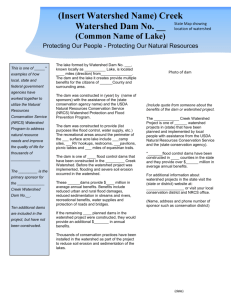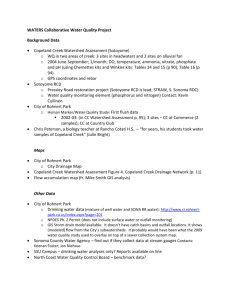February 2012 - California Association of Resource Conservation
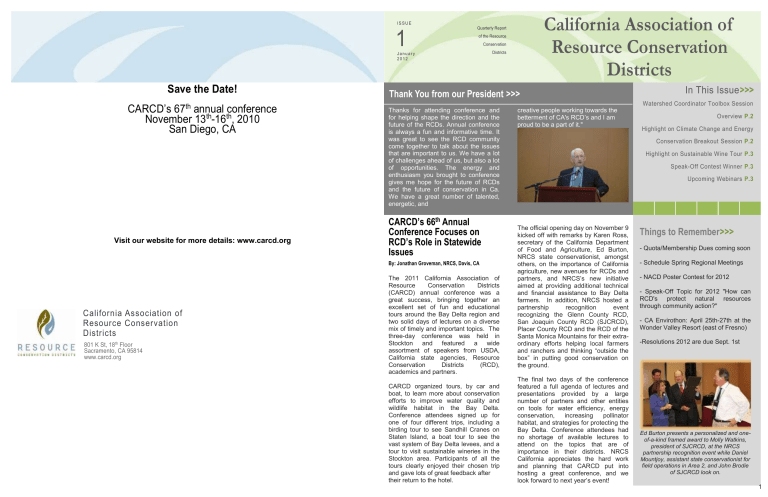
Save the Date!
CARCD’s 67
th
annual conference
November 13
th
16
San Diego, CA
th
, 2010
Visit our website for more details: www.carcd.org
California Association of
Resource Conservation
Districts
801 K St, 18 th Floor
Sacramento, CA 95814 www.carcd.org
I S S U E
1
J a n u a r y
2 0 1 2
Quarterly Report of the Resource
Conservation
Districts
Thank You from our President >>>
Thanks for attending conference and for helping shape the direction and the future of the RCDs. Annual conference is always a fun and informative time. It was great to see the RCD community come together to talk about the issues that are important to us. We have a lot of challenges ahead of us, but also a lot of opportunities. The energy and enthusiasm you brought to conference gives me hope for the future of RCDs and the future of conservation in Ca.
We have a great number of talented, energetic, and
California Association of
Resource Conservation
Districts
In This Issue
>>>
Watershed Coordinator Toolbox Session creative people working towards the betterment of CA's RCD’s and I am proud to be a part of it."
Overview P.2
Highlight on Climate Change and Energy
Conservation Breakout Session P.2
Highlight on Sustainable Wine Tour P.3
Speak-Off Contest Winner P.3
Upcoming Webinars P.3
CARCD’s 66
th
Annual
Conference Focuses on
RCD’s Role in Statewide
Issues
By: Jonathan Groveman, NRCS, Davis, CA
The 2011 California Association of
Resource Conservation Districts
(CARCD) annual conference was a great success, bringing together an excellent set of fun and educational tours around the Bay Delta region and two solid days of lectures on a diverse mix of timely and important topics. The three-day conference was held in
Stockton and featured a wide assortment of speakers from USDA,
California state agencies, Resource
Conservation Districts (RCD), academics and partners.
CARCD organized tours, by car and boat, to learn more about conservation efforts to improve water quality and wildlife habitat in the Bay Delta.
Conference attendees signed up for one of four different trips, including a birding tour to see Sandhill Cranes on
Staten Island, a boat tour to see the vast system of Bay Delta levees, and a tour to visit sustainable wineries in the
Stockton area. Participants of all the tours clearly enjoyed their chosen trip and gave lots of great feedback after their return to the hotel.
The official opening day on November 9 kicked off with remarks by Karen Ross, secretary of the California Department of Food and Agriculture, Ed Burton,
NRCS state conservationist, amongst others, on the importance of California agriculture, new avenues for RCDs and partners, and NRCS’s new initiative aimed at providing additional technical and financial assistance to Bay Delta farmers. In addition, NRCS hosted a partnership recognition event recognizing the Glenn County RCD,
San Joaquin County RCD (SJCRCD),
Placer County RCD and the RCD of the
Santa Monica Mountains for their extraordinary efforts helping local farmers and ranchers and thinking “outside the box” in putting good conservation on the ground.
The final two days of the conference featured a full agenda of lectures and presentations provided by a large number of partners and other entities on tools for water efficiency, energy conservation, increasing pollinator habitat, and strategies for protecting the
Bay Delta. Conference attendees had no shortage of available lectures to attend on the topics that are of importance in their districts. NRCS
California appreciates the hard work and planning that CARCD put into hosting a great conference, and we look forward to next year’s event!
Things to Remember
>>>
- Quota/Membership Dues coming soon
- Schedule Spring Regional Meetings
- NACD Poster Contest for 2012
- Speak-Off Topic for 2012 "How can
RCD's protect natural resources through community action?"
- CA Envirothon: April 25th-27th at the
Wonder Valley Resort (east of Fresno)
-Resolutions 2012 are due Sept. 1st
Ed Burton presents a personalized and oneof-a-kind framed award to Molly Watkins, president of SJCRCD, at the NRCS partnership recognition event while Daniel
Mountjoy, assistant state conservationist for field operations in Area 2, and John Brodie of SJCRCD look on.
1
2
Watershed Coordinator Toolbox Session
>>>
The CARCD conference offered watershed coordinators from across
California to chance to gather and share their secrets to success. The
Watershed Coordinator Toolbox
Training was a two hour workshop that focused on equipping watershed coordinators with the tools necessary for working in their watersheds. One of the main focuses of this workshop was to provide an opportunity for statewide networking of watershed coordinators.
Sharing difficulties and successes of coordination efforts throughout the state will lead to great success in the future.
Several experienced watershed coordinators shared a few words of wisdom in watershed coordination, sharing success stories or difficulties they have faced and how they overcame them. John Brodie, the
Mokelumne River watershed coordinator, shared his experience in maintaining an established stakeholder group. Greg Dills, the watershed coordinator for the Lake County RCDs, spoke to establishing effective partnerships to facilitate project implementation. Leigh Sharp, the district manager of the Napa County
RCD, discussed the process of moving from planning with stakeholders to onthe-ground implementation. Melina
Watts, the Santa Monica Mountains watershed coordinator, shared her expertise on media & public outreach.
These short presentations provided many ideas on pertinent issues in watershed coordination.
Melina Watts also provided a facilitation training that helped to share the necessary steps to facilitating a watershed group. The broad range of topics covered gathering stakeholders, being a neutral facilitator, and how to work toward consensus. The presentation followed the process of creating a watershed plan while identify the necessary tools to be successful.
The coordinators were then divided into groups, given a factious watershed, the watershed.
The Watershed Coordinator Toolbox
Training allowed an opportunity for coordinators to meet & greet, share their experiences, and gain new tools that will help them work successfully throughout the California. Thank you to all the watershed coordinators that are dedicated to conserving and improving watersheds across the state. stakeholder roles to play, and asked to work together to come to a consensus, deciding on the most relevant issues in the watershed.
CARCD Breakout Session Touches on
Climate Change & Energy Conservation >>>
By: Jonathon Groveman, NRCS, Davis, CA opportunity for coordinators to meet & greet, share their experiences, and gain new tools that will help them work successfully throughout the California.
Thank you to all the watershed coordinators that are dedicated to conserving and improving watersheds across the state. methods.
In particular, the breakout session on November 9 touched on a very timely and heavily discussed topic: climate change. Four sub topics were discussed during the 80minute session, including how landowners can self estimate
opening session
fuel and energy savings on-farm or ranch. NRCS California
Climate Change Specialist Lucinda Roth led the 50 attendees through the online process for evaluating changing lighting, heating and other equipment to reduce energy consumption and save a few dollars along the way.
Furthermore, employees from various RCDs discussed how
Lucinda Roth, NRCS California Climate Change Specialist, educates a group of RCD and NRCS employees about energy reduction techniques during a CARCD breakout session Nov. 9, 2011.
they reach out to traditionally underserved clients to inform them about agricultural-related climate change factors and how making a few changes to energy consumption can have a profound impact on reduced energy costs.
The topics of climate change and energy conservation are making headlines these days in the media, and farmers and ranchers are just as interested in learning about energysaving techniques as residents in urban communities. A little can go a long way in reducing energy consumption.
Touring the Winning Ways
of Sustainable Wineries
By: Anita Brown, NRCS, Davis, CA
Did you know that more wine is produced in the Lodi appellation than in the entire
State of Oregon? That’s just one of the eye-opening bits of information picked up by conservationists on a recent tour offered on the opening day of the 66 th annual
CARCD conference.
The tour focused on the large range of ecosystem services now being provided by the wine grape growers of the Lodi region.
Vino Farms, a long-time cooperator with the local conservation office, was one of the three stops offered on that tour.
As if producing tasty wine for a thirsty world were not enough, Vino Farms is also using native plant cover crops to naturally build the soil, insectary plants for pest control, and solar panels for energy. “The more ecosystem services we produce from our farm, the fewer products we need to bring on our farm and the more sustainable we are ,” said Chris Storm, viticulturalist for
Vino Farms. John Ledbetter, owner of
Vino Farms was nominated for the 2011
Leopold Conservation Award.
Arguably the most ambitious the farm’s conservation undertaking is a mile-long restoration of habitat for plants and animals been populated with plants native not just to California, but to the immediate region.
Technical support for the restoration project was provided by John Brodie of the
San Joaquin RCD as well as by Glenn
Wilcox, Sarah Lucchetti, and Ora Van
Steyn of NRCS. Area students got into the act as well, building a hedgerow between
Vino Farms and the neighboring farm to the west. Student work was coordinated through the SLEWS (Student and
Landowner Education and Watershed
Stewardship) program.
NRCS was one of many partners that contributed funding. Although their milelong restoration project cost $400,000,
Storm said Vino Farms actually had to turn down partner contributions. “People saw what we could do here and they wanted to be involved in something successful,” he said.
Between the vineyard and the Mokelumne
River lies 25 acres of richly complex native riparian species, installed by Vino Farms just four years ago with the help of the San
Joaquin RCD, NRCS and several other partners.
Amy King of Solano County RCD, visiting
Vino Farms’ riparian habitat on the
Sustainable Wine tour at the CARCD’s 66 th
Annual conference.
Upcoming Webinars from BB&K (free to all RCDs) >>>
Feb. 23rd: Federal and State Prevailing Wage Laws
May 16th: Conservation Easements
Aug. 23rd: Agricultural Discharge Waiver Issues in a strip of the vineyard bordering the
Oct. 17th: The Brown Act and the Role of Board Members
Mokelumne River. The riparian region has
Speak-Off Contest Winner
>>>
This year’s Speak-Off contest winner was
Ashley Flood, representing Colusa County.
The contests each spoke on the topic
"What can RCDs do to help bridge sustainable conservation practices with food safety practices?". Next year’s speakoff contest topic will be "How can RCD's protect natural resources through community action?", We look forward to hearing these young people speeches at next year’s conference!
Left: Speak-Off Contest Winner, Ashley Flood
Below: Ed Burton and Karen Buhr congratulate speak-off contest participants
3
